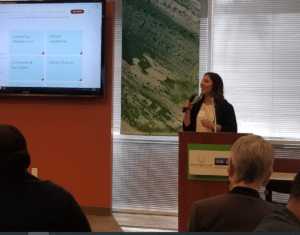
Becca Velasco is the Senior Manager of Strategy & Growth at the Partnership for LA Schools and also co-leads the ProjectLIT Watts Book Club for students at Edwin Markham Middle School. Becca received her Bachelor’s degree in American Studies from Stanford University and her Master of Public Policy from the USC Price School of Public Policy. In her free time, she enjoys reading, running, and cooking at home.
Best practices in public education are widely discussed, but rarely meaningfully applied. What do best practices look like, and who decides? Over these last few months, best practices and frameworks to address COVID-19’s impact on schools and communities have proliferated, but there’s no real playbook for what we’re dealing with. And in reality, there’s no perfect playbook or standardized way to approach school transformation, either.
What we do know is that this moment highlights the need to embrace reflection, sharing, and learning across the education sector. In the Partnership Playbook for School Transformation, a comprehensive codification effort and website project that I led at the Partnership for LA Schools, we suggest a not-so-revolutionary but distinct idea: that the work of school transformation is a practice. What’s “best” for one school is not always the best for others. We understand that school transformation is not — and never will be — a one-size-fits-all approach. This is especially true in Los Angeles, where we see dynamic diversity and different needs across our 18 schools in the communities of Watts, South LA, and Boyle Heights. And it’s especially true now, as all of us in the field contemplate how to best support individual schools and students as they acclimate to the new reality created by COVID-19.
The Playbook began as an effort to reflect on where my organization has been over the last 13 years of its existence, and to create a foundation from which other districts and systems could learn from our practice, grounded in the realities of implementation. Instead of leading with “what works best?”, I encouraged us to take a step back and reflect: What is it that we do? What do we believe about what we do? How did we get here?

Becca showcases the Partnership Playbook at the Partnership’s “Partnering for Equity Convening” on February 27, 2020, with over 150 people in attendance.
The process of answering these questions was messy work. It required me to lead with humility, very quickly build trust with staff, and model and encourage honesty, all the while navigating and bringing together differences of opinion that exist about our work, even at the administrative office level.
The Playbook was the culmination of this massive, organization-wide effort to reflect and explore what we’ve learned over the last 13 years, identify missteps we’ve made and challenges we’ve experienced, and — most importantly — outline a path forward for public school systems to accelerate equity for low-income students and students of color. Much of what we now consider to be our own “best” practices really came from the mistakes we’ve made over the last decade and our willingness to be honest about them. The honesty and humility that we worked hard to make sure comes through the Playbook is intentional, and we hope that districts and systems can avoid making the same mistakes we did over the years as we practiced school transformation.
Sharing our work with one another in meaningful ways is challenging. I’ve previously worked in organizations where much time was spent talking about best practices, with little action or follow-through. Resources and tools like the Playbook should be matched with a willingness to share time and be a thought partner in implementation, at the very minimum. We’re eager to do this at the Partnership, and invite you to learn more about how we can support your work.
COVID-19 has forced us into a vacuum where all of a sudden, organizations are rapidly — at a speed that’s been a bit bewildering — sharing resources, frameworks, and models to try to answer the important questions we’re confronted with in public education systems across the country. As an organization, we grappled with whether or not to add to this rush of information, because we recognized that absorbing it was becoming a body of work unto itself. Instead, we hold ourselves accountable — and call on others to seize this moment of openness and learning — to recognize that we don’t have all the answers, especially when it comes to distance learning. Rather than market slick solutions to problems none of us have ever encountered in our lifetimes, together let’s use this crisis as an opportunity to create new and deeper connections across the sector and grow together.
We hope you’ll heed our call and reach out to learn more about our work and approaches to school transformation because we want to learn from yours.
